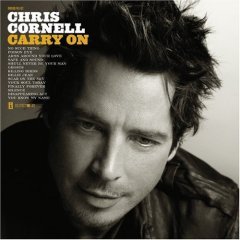
Chris Cornell should not have carried on
 Chris Cornell’s first post-Soundgarden release, 1999’s Euphoria Morning, was an artistic triumph and a commercial flop. Apparently, most of the fans who loved him in Soundgarden didn’t care for his more introspective side. Perhaps in response, Cornell hooked up with three quarters of Rage Against the Machine to form Audioslave. Anxious to get to work on his second solo album, Cornell left Audioslave after three albums last February.
Chris Cornell’s first post-Soundgarden release, 1999’s Euphoria Morning, was an artistic triumph and a commercial flop. Apparently, most of the fans who loved him in Soundgarden didn’t care for his more introspective side. Perhaps in response, Cornell hooked up with three quarters of Rage Against the Machine to form Audioslave. Anxious to get to work on his second solo album, Cornell left Audioslave after three albums last February.
Prior to the official breakup, Cornell surfaced as a solo artist with “You Know My Name,” the theme song for the James Bond film Casino Royale. It was a promising signal of things to come — but it turns out to have been a misleading one as well as his new album, Carry On, is a an uninspired bore.
Things begin promisingly enough. The album opener, “No Such Thing,” bursts out of the gate with more energy than anything on Euphoria Morning, and seems to reveal Cornell as re-energized by his time in Audioslave. The song is done in by two things, however – an extremely awkward chorus and Cornell’s voice, which is not nearly as powerful as in years past.
The second track, “Poison Eye”, is Badmotorfinger-era Soundgarden with the instruments turned down. It’s got an almost funk feel to it and is it one of the few highlights on the album. From there, things get worse in a hurry.
“Arms Around Your Love” shows Cornell settling into middle-aged MOR rocker mode. It’s a safe song, but still catchy. But after that, a run of four equally bland and forgettable songs (“Safe and Sound”, “She’ll Never Be Your Man”, “Ghosts”, and “Killing Birds”) grinds the proceedings to a halt.
Cornell’s decision to include a cover of Michael Jackson’s “Billie Jean” has gimmick written all over it. The whole idea of reworking a famous pop song as a more serious one is tired at this point. At least Alanis Morissette had the good sense to put her cover of “My Humps” on her website for free.
A trio of decent but still bland songs follows (“Scar on the Sky”, “Your Soul Today”, “Finally Forever”), and all hope seems lost. The album is redeemed partially by “Silence the Voices,” which includes a number of effective chord changes, and “Disappearing Act,” which would fare better if the rest of the album had more energy.
Carry On closes with the aforementioned “You Know My Name,” although with a slightly different arrangement than the 007 version. The songwriting and execution of this song is clearly a notch above most of the others on this album, which makes its inclusion seem a bit calculated. Is it possible that Cornell or his record company included it in order to save an otherwise disappointing effort, a la the Beach Boys’ inclusion of “Good Vibrations” on Smiley Smile?
Displaying neither the inventiveness or conviction of Euphoria Morning, nor the intensity of Audioslave’s or Soundgarden’s catalogs, Carry On is a definite black mark on Chris Cornell’s musical resume.

Thom
I have to say that I was disappointed in Euphoria Morning, but the 007 track had me intrigued by this album, too. It’s a shame, I think he’s really talented. But just like Cantrell did with Boggy Depot, I think he’s too hung up on making sure his solo work sounds like his group work so as not to alienate fans.
Personally I just want him to do some acoustic work like the brilliant “Seasons” from the Singles soundtrack.